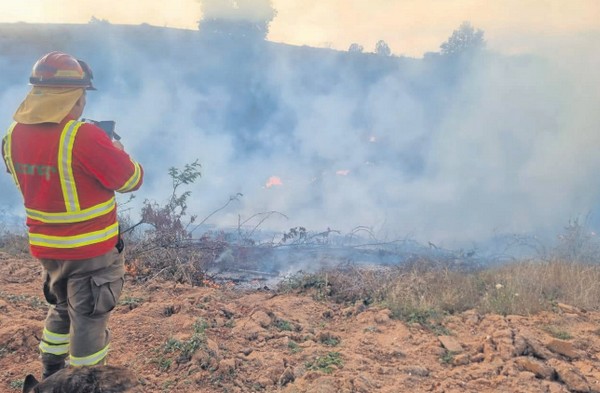The proposed legislation aims to clearly establish criteria and responsibilities for the prevention, combat, and recovery from wildfires in the country.
With no clear certainty about the approval of the Fire Law during this summer, local lawmakers expressed concern over the lengthy legislative process in Congress, emphasizing its importance in defining responsibilities for prevention, firefighting, and recovery from these emergencies, which are more frequent during the summer season.
Currently, the bill submitted by the Executive Branch to Congress in October 2023 is in its second constitutional review in the Senate, awaiting approval in detail by the Agriculture Committee. Since late October this year, the government has pushed for "Urgent Summa" status to ensure the law could be enacted during the most critical period of the 2024-2025 wildfire season.
The new legislation seeks to establish tools such as urban-rural interface zones and buffer zones, while also strengthening existing forest management measures to reduce the risk of wildfires and rural fires. Additionally, it aims to introduce principles of shared responsibility, a preventive and territorial approach, defining terms like agroforestry, fire threat, fuel, firebreaks, fuel breaks, integrated fire management, among others.
OBSTACLES
Senator Gastón Saavedra (PS) explained that the delay in the Agriculture Committee is due to the fact that the parameters on preventive and action-related responsibilities "have demands that clearly pressure the interests of those involved, so the legislature must be cautious to later secure favorable votes in the chamber."
Eric Aedo (DC), Deputy Vice President of the Chamber of Deputies, stated that the main sticking point is "an amendment that prohibits reconstruction in burned areas. A significant group of deputies disagrees because many of these areas are urban, which would hinder city development. Moreover, if safeguards or improvements are implemented, why ban construction? This is an issue where no agreement has been reached."
His counterpart, Deputy Flor Weisse (UDI), pointed out that the bill focuses on prevention but at the expense of private entities. "So far, the burden falls heavily on the private sector—property owners—requiring preventive measures, but government compensation and support remain unclear. In the case of firebreaks, property rights are violated—it’s a form of expropriation, as the productive value of the land is lost," she explained.
URGENT CALL
Although lawmakers insist on the urgency and hope the bill is approved as soon as possible, they agree that even if an agreement is reached, legislative timelines make it unlikely the law will be enacted this summer.
Deputies Marlene Pérez (IND) and María Candelaria Acevedo (PC) lamented the lack of consensus, stressing the necessity of the bill given the severe wildfires recorded in the region and neighboring areas.
In this regard, Pérez stated, "It’s incomprehensible, knowing we face a critical scenario due to high temperatures this summer, which increases wildfire risks. I hope this law passes before the legislative recess."
"I hope senators can vote on the bill’s details soon in committee so it moves to the chamber. We’ve already had major fires in recent days, which is why I expect them to step up, give fewer press statements, and legislate so relevant agencies have better tools," said Acevedo.
IMPORTANCE OF THE LEGISLATION
Lawmakers argue the law’s approval is urgent, as it improves prevention in urban-forest interfaces, leveraging Municipal and Intermunicipal Regulatory Plans. They also highlighted the creation of the National Forest Service (Sernafor), part of another bill under Senate review, which would strengthen enforcement and ensure the law is not rendered ineffective, alongside stricter penalties for intentional fires.
Source:El Sur







Comentarios (0)
No hay comentarios aún. ¡Sé el primero en comentar!
Deja un comentario